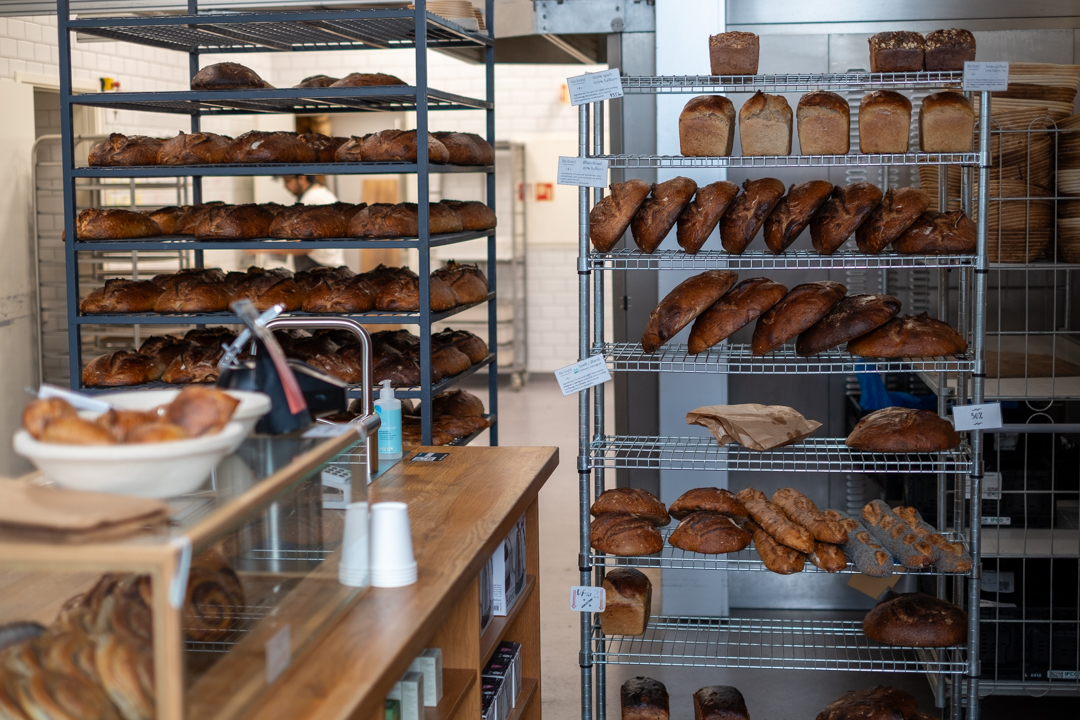Few names in Oslo’s bakery circle can invoke as much respect and awe as Ille Brød. Established in 2015 in a home kitchen in Western Oslo’s Bygdøy area, under the name “Bygdøy surdeigsbakeri” (“Bygdøy sourdough bakery”), the half-serious-half-hobby micro-bakery gradually took shape, and eventually in 2017 moved into a proper production facility on Lakkegata, where the shop is still located today.
The two founders, Martin Fjeld og Casper Lugg, are both from Fredrikstad, a city roughly 90 km south of Oslo. In their dialect, «ille bra» (which can be loosely translated as “awfully good”) is a phrase commonly used to describe something particularly good. Jokingly, the two young bakers started to refer to their particularly successful bread as «ille brød» (something to the effect of “awfully (good) bread”). Hence the bakery’s name.

To some extent, Ille Brød is one of the forerunners that started the craze of sourdough baking in the whole Norway. As early as 2012, the two founders already started experimenting with different sourghdough baking methods, which resulted in a highly successful Instagram account as well as a book. The book, named Sourdough, has been translated into seven languages and sold worldwide.
Despite its size, the bakery’s reputation attracted many unexpected guests—some of them came from afar. On Ille Brød’s opening day in November 2017, the owner Martin Fjeld came to open the shop in the early morning, only to find a young man from Tokyo already standing there waiting for him. His name is Tsukasa Miyawaki (宮脇司), and has “an obsession with (Norwegian) baking”, Miyawaki told local newspapers in an interview a few years later. In this somewhat dramatic way, Miyawaki became both the first customer as well as the first apprentice of Ille Brød.

Squeezed in a somewhat awkward area between Grønland and Tøyen subway station, the location of the bakery feels isolated—one needs to deliberately go out of ones way to pay a visit here. The bakery’s front features a floor-to-ceiling shaded glass wall.

Inside, the production area takes up most of the space, leaving an open counter by the entrance for direct sales. There is no seating area, but when the weather is nice, many people choose to sit outside in a small coutyard, half exposed to a busy street.

On our latest visit, there were both cinnamon and cardamom rolls (55 NOK each) were available on the counter. Both were made with sourdough. In addition, batch-brewed coffee made with beans from Tim Wendelboe was for sale. The shelf by the counter was filled with sourdough bread (135 NOK) one can buy to take home.

Cinnamon rolls

Cardamom rolls
We really loved the cardamom roll, but were genuinely impressed by the cinnamon roll. What sets Ille Brød apart from other sourdough bakeries is that their cinnamon and cardamom rolls had an exceptionally pure, clear and long-lasting sourdough flavour—this is particularly difficult with cinnamon rolls, as the exotic cinnamon taste, when mixed with sourdough, more often than not would lead to a somewhat bitter aftertaste. Despite all the ups and downs in the bakery’s fortune, it remained the ultimate place if one is looking for Oslo’s best sourdough pastries and bread.
The bakery’s current status is by no means Ille Brød at its best. Back in 2017, bread from Ille Brød had instantly become a sign of exclusiveness and quality in Oslo’s high-end restaurants. In 2021, the bakery’s reputation reached its peak—it won Matprisen 2021, one of the most prestigious prizes in the Norwegian food industry, and was crowned by readers of Aftenposten, one of Norway’s largest newspapers, as the best bakery in Oslo in 2022. Among their illustrious clients were Oslo’s most popular cafés, Michelin-star restaurants as well as the Norwegian royal family.
Behind the dazzling achievements, however, lies the bakery’s economic struggles. The bakery has been heavily dependent on business and restaurant clients, but such sales could not generate enough profit. As a result, it has been running in deficit for all these years, except only for 2021.

In 2023, in an attempt to boost direct sales to private customers, the bakery tried to seek out new investments, but was rejected by all the banks they talked to. It then turned to crowdfunding, and successfully raised 2.37 million NOK—even though it was barely half of the 5 million goal they had hoped for. With the new capital, Ille Brød opened a second shop in Oslo’s affluent Briskeby area in November 2023. Yet the new shop still did not manage to bring in enough revenue, and was closed only six months later on March 27, 2024.
Failure of the Briskeby shop dealt a heavy blow to the bakery’s already weak financial foundation, and it had to not only lay off several of the best bakers on the team—including Miyawaki and his wife Nozomi Miyawaki(宮脇のぞみ) who went on to work as bakers and pastry chefs at The Little Pickle. Ille Brød then had to reduce the production capacity as well as opening hours in their main shop on Lakkegata. “Since our opening six and half years ago, it has been a challenge to make ends meet”, founder and owner Martin Fjeld wrote on social media, “but lately our economic situation has gone from bad to much worse.”

The story of the bakery’s struggles has attracted widespread attention on social media, and based on our observation in the shop, more people were coming to buy bread in the shop, as a way of support. The bakery has also been gradually reverting to its old opening hours. It has certainly struck a chord of the most profund empathy: when something is this wonderful, we should never let it go without a fight.
